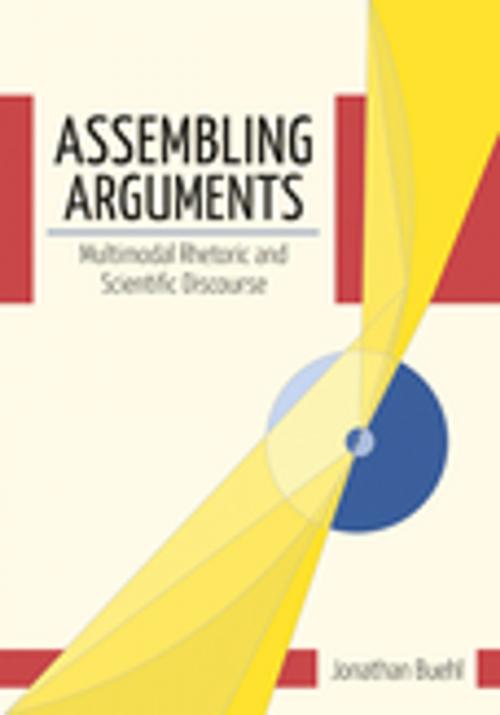Assembling Arguments
Multimodal Rhetoric and Scientific Discourse
Nonfiction, Reference & Language, Language Arts, Public Speaking, Rhetoric| Author: | Jonathan Buehl, Thomas W. Benson | ISBN: | 9781611175622 |
| Publisher: | University of South Carolina Press | Publication: | January 20, 2016 |
| Imprint: | University of South Carolina Press | Language: | English |
| Author: | Jonathan Buehl, Thomas W. Benson |
| ISBN: | 9781611175622 |
| Publisher: | University of South Carolina Press |
| Publication: | January 20, 2016 |
| Imprint: | University of South Carolina Press |
| Language: | English |
Scientific arguments—and indeed arguments in most disciplines—depend on visuals and other nontextual elements; however, most models of argumentation typically neglect these important resources. In Assembling Arguments, Jonathan Buehl offers a concentrated study of scientific argumentation that is sensitive to both the historical and theoretical possibilities of multimodal persuasion as it advances two related claims. First, rhetorical theory—when augmented with methods for reading nonverbal representations—can provide the analytical tools needed to understand and appreciate multimodal scientific arguments. Second, science—an inherently multimodal enterprise—offers ideal subjects for developing general theories of multimodal rhetoric applicable across fields. In developing these claims, Buehl offers a comprehensive account of scientific persuasion as a multimodal process and develops a simple but productive framework for analyzing and teaching multimodal argumentation. Comprising five case studies, the book provides detailed treatments of argumentation in specific technological and historical contexts: argumentation before World War I, when images circulated by hand and by post; argumentation during the mid-twentieth century, when computers were beginning to bolster scientific inquiry but images remained hand-crafted products; and argumentation at the turn of the twenty-first century—an era of digital revolutions and digital fraud. Each study examines the rhetorical problems and strategies of specific scientists to investigate key issues regarding visualization and argument: 1) establishing new instruments as reliable sources of visual evidence; 2) creating novel arguments from reliable visual evidence; 3) creating novel arguments with unreliable visual evidence; 4) preserving the credibility of visualization practices; and 5) creating multimodal artifacts before and in the era of digital circulation. Given the growing enterprise of rhetorical studies and the field’s contributions to communication practices in all disciplines, rhetoricians need a comprehensive rhetoric of science—one that accounts for the multimodal arguments that change our relation to reality. Assembling Arguments argues that such rhetoric should enable the interpretation of visual scientific arguments and improve science-writing instruction.
Scientific arguments—and indeed arguments in most disciplines—depend on visuals and other nontextual elements; however, most models of argumentation typically neglect these important resources. In Assembling Arguments, Jonathan Buehl offers a concentrated study of scientific argumentation that is sensitive to both the historical and theoretical possibilities of multimodal persuasion as it advances two related claims. First, rhetorical theory—when augmented with methods for reading nonverbal representations—can provide the analytical tools needed to understand and appreciate multimodal scientific arguments. Second, science—an inherently multimodal enterprise—offers ideal subjects for developing general theories of multimodal rhetoric applicable across fields. In developing these claims, Buehl offers a comprehensive account of scientific persuasion as a multimodal process and develops a simple but productive framework for analyzing and teaching multimodal argumentation. Comprising five case studies, the book provides detailed treatments of argumentation in specific technological and historical contexts: argumentation before World War I, when images circulated by hand and by post; argumentation during the mid-twentieth century, when computers were beginning to bolster scientific inquiry but images remained hand-crafted products; and argumentation at the turn of the twenty-first century—an era of digital revolutions and digital fraud. Each study examines the rhetorical problems and strategies of specific scientists to investigate key issues regarding visualization and argument: 1) establishing new instruments as reliable sources of visual evidence; 2) creating novel arguments from reliable visual evidence; 3) creating novel arguments with unreliable visual evidence; 4) preserving the credibility of visualization practices; and 5) creating multimodal artifacts before and in the era of digital circulation. Given the growing enterprise of rhetorical studies and the field’s contributions to communication practices in all disciplines, rhetoricians need a comprehensive rhetoric of science—one that accounts for the multimodal arguments that change our relation to reality. Assembling Arguments argues that such rhetoric should enable the interpretation of visual scientific arguments and improve science-writing instruction.















